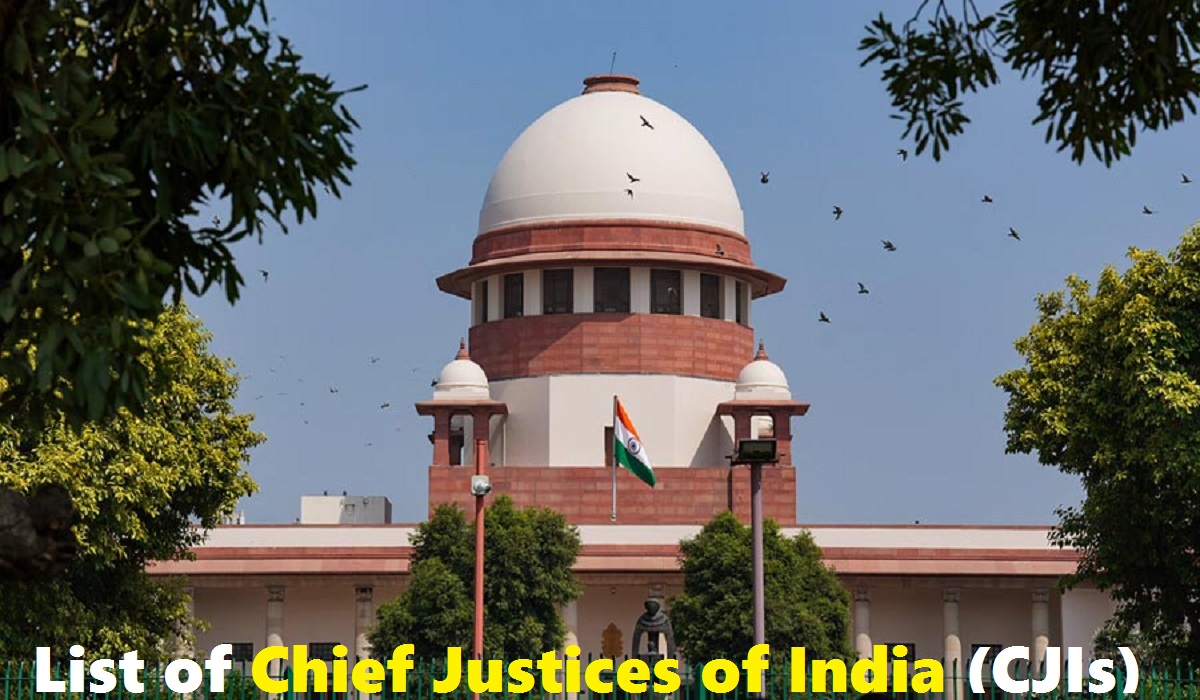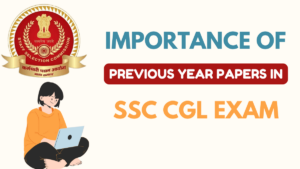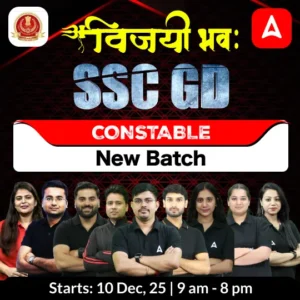The designation of The Chief Justice of India (CJI) is one of the most powerful figures in the Republic of India. The importance of the post of CJI lies in the fact that during the absence of the president and Vice president, the Chief Justice of India acts as the President of the country. Since independence, a total of 50 exceptional lawmakers have held the office of Chief Justice of India.
Chief Justice of India
The Chief Justice of India is the head of the entire Judicial System of India. The persons appointed to this position are some of the most intellectually rich people in the entire world. The current Chief Justice of India is ‘Justice D Y Chandrachud. In the sections below, let us take a look at the various aspects of the post of CJI.
Qualifications of the Chief Justice of India
The person to be considered for the post of Chief Justice of India must be a citizen of India and should have some specific qualifications in terms of Work Experience. To run for the post of president, the candidate must have completed five years as a Judge of a High Court or t ten years as an advocate of a High Court or as a distinguished jurist.
Appointment of the Chief Justice of India
The Constitution of India provides a detailed procedure for the appointment of the Chief Justice of India. The CJI and the Judges of the Supreme Court (SC) are appointed by the President under clause (2) of Article 124 of the Constitution. SC in the Second Judges Case (1993), ruled that the senior most judge of the Supreme Court should alone be appointed to the office of the CJI.
Powers of the Chief Justice of India
- The CJI acts as the administrative head of the Supreme Court/
- He/She exercises the prerogative of allocating cases to particular benches.
- The CJI also decides the number of judges that will hear a case.
Current Chief Justice of India
At present, Justice Dhanajaya Yeshwant Chandrachud is the Chief Justice of India. He was appointed as the 50th Chief Justice of India (CJI) succeeding the 49th CJI Uday Umesh Lalit. is a former Chief Justice of the Allahabad High Court and a former judge of the Bombay High Court. He has been a part of some of the most iconic rulings of the honorable Supreme Court.
- The Ayodhya land dispute judgment.
- The right to privacy is a Fundamental Right.
- Striking down the parts of Section 377 of the Indian Penal Code.
- The validity of the Aadhaar scheme.
- The Sabarimala issue.
Complete List Of Chief Justices of India (1950-2024)
| CJI Name | Complete Tenure | |
| From Date | Till Date | |
| H.J Kania | 26 January 1950 | 6 November 1951 |
| M. Patanjali Sastri | 7 November 1951 | 3 January 1954 |
| Mehr Chand Mahajan | 4 January 1954 | 22 December 1954 |
| Bijan Kumar Mukherjea | 23 December 1954 | 31 January 1956 |
| Sudhi Ranjan Das | 1 February 1956 | 30 September 1959 |
| Bhuvaneshwar Prasad Sinha | 1 October 1959 | 31 January 1964 |
| P. B. Gajendragadkar | 1 February 1964 | 15 March 1966 |
| Amal Kumar Sarkar | 16 March 1966 | 29 June 1966 |
| Koka Subba Rao | 30 June 1966 | 11 April 1967 |
| Kailas Nath Wanchoo | 12 April 1967 | 24 February 1968 |
| Mohammad Hidayatullah | 25 February 1968 | 16 December 1970 |
| Jayantilal Chhotalal Shah | 17 December 1970 | 21 January 1971 |
| Sarv Mittra Sikri | 22 January 1971 | 25 April 1973 |
| A. N. Ray | 26 April 1973 | 27 January 1977 |
| Mirza Hameedullah Beg | 29 January 1977 | 21 February 1978 |
| Y. V. Chandrachud | 22 February 1978 | 11 July 1985 |
| P. N. Bhagwati | 12 July 1985 | 20 December 1986 |
| Raghunandan Swarup Pathak | 21 December 1986 | 18 June 1989 |
| Engalaguppe Seetharamaiah Venkataramiah | 19 June 1989 | 17 December 1989 |
| Sabyasachi Mukharji | 18 December 1989 | 25 September 1990 |
| Ranganath Misra | 26 September 1990 | 24 November 1991 |
| Kamal Narain Singh | 25 November 1991 | 12 December 1991 |
| Madhukar Hiralal Kania | 13 December 1991 | 17 November 1992 |
| Lalit Mohan Sharma | 18 November 1992 | 11 February 1993 |
| M. N. Venkatachaliah | 12 February 1993 | 24 October 1994 |
| Aziz Mushabber Ahmadi | 25 October 1994 | 24 March 1997 |
| J. S. Verma | 25 March 1997 | 17 January 1998 |
| Madan Mohan Punchhi | 18 January 1998 | 9 October 1998 |
| Adarsh Sein Anand | 10 October 1998 | 31 October 2001 |
| Sam Piroj Bharucha | 1 November 2001 | 5 May 2002 |
| Bhupinder Nath Kirpal | 6 May 2002 | 7 November 2002 |
| Gopal Ballav Pattanaik | 8 November 2002 | 18 December 2002 |
| V. N. Khare | 19 December 2002 | 1 May 2004 |
| S. Rajendra Babu | 2 May 2004 | 31 May 2004 |
| Ramesh Chandra Lahoti | 1 June 2004 | 31 October 2005 |
| Yogesh Kumar Sabharwal | 1 November 2005 | 13 January 2007 |
| K. G. Balakrishnan | 14 January 2007 | 12 May 2010 |
| S. H. Kapadia | 12 May 2010 | 28 September 2012 |
| Altamas Kabir | 29 September 2012 | 18 July 2013 |
| P. Sathasivam | 19 July 2013 | 26 April 2014 |
| Rajendra Mal Lodha | 27 April 2014 | 27 September 2014 |
| H. L. Dattu | 28 September 2014 | 2 December 2015 |
| T. S. Thakur | 3 December 2015 | 3 January 2017 |
| Jagdish Singh Khehar | 4 January 2017 | 27 August 2017 |
| Dipak Misra | 28 August 2017 | 2 October 2018 |
| Ranjan Gogoi | 3 October 2018 | 17 November 2019 |
| Sharad Arvind Bobde | 18 November 2019 | 23 April 2021 |
| N. V. Ramana | 24 April 2021 | 26 August 2022 |
| U. U. Lalit | 27 August 2022 | 8 November 2022 |
| D. Y. Chandrachud | 9 November 2022 | Incumbent |
| Check Out These Links | |
| SSC CGL Recruitment | SSC CHSL Recruitment |
| SSC CPO Recruitment | SSC MTS Recruitment |



 How can I get selected for Delhi Police ...
How can I get selected for Delhi Police ...
 SSC CHSL Vs. SSC CGL – What Changes in S...
SSC CHSL Vs. SSC CGL – What Changes in S...
 Importance of Solving Previous Year Pape...
Importance of Solving Previous Year Pape...










